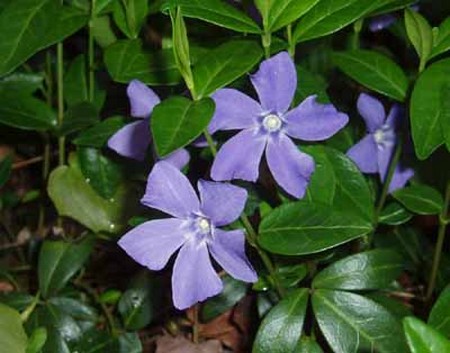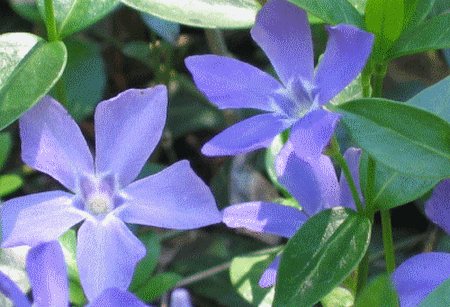The periwinkle with its soft blue windmill-shaped flowers is a hardy evergreen plant with shining leaves making good ground cover in winter, earning its common name, joy of the ground. The two wild periwinkles grow in woodlands and banks all over Europe. They are the lesser periwinkle, Vinca minor, and the greater periwinkle, Vinca major.
The word periwinkle comes from the old Latin name Vinca pervinca, deriving from pervincine, meaning to bind closely, or from perrincere, to overcome. The long creeping stems of periwinkle bind together and to neighbouring plants. Culpeper said that if the leaves were eaten by a man and woman together, it will hind them closer. The whole plant was considered a vital ingredient for love philtres to guarantee a happy marriage. Culpeper said the periwinkle was ruled by Venus. The flowers were strewed on the path of the bride and groom; the blue flowers symbolized the virginity of the bride, and the evergreen leaves the everlasting love of the young couple.
In the language of flowers periwinkle means unbreakable friendship and tender memories. In Italy plaited garlands of periwinkle were placed on the coffins of dead children, and were known as ‘flowers of death’, symbolizing immortality, eternity and tender memories.
Periwinkle may also mean to overcome – it was once bound to the legs to overcome cramp, to the skin to stop bleeding of cuts and wounds, and when fastened around the thigh of a pregnant woman to prevent miscarriage. Medicinally, it has a binding quality, acting as an astringent, stopping diarrhoea and dysentery, as well as bleeding.
Herbal remedy
Culpeper aptly described the medicinal virtues of periwinkle when he said it is a ‘great binder and stays bleeding at the mouth and nose, if it be chewed. It is a good female medicine and may be used with advantage in hysterical and other fits’. The astringent tannins in periwinkle act to curb diarrhoea and dysentery’, and to protect the walls of the digestive tract from irritation and infection. They also stop bleeding. Periwinkle reduces excessive menstrual bleeding, and makes a good vaginal douche for discharges, a lotion for haemorrhoids and varicose veins, and relieves a variety of skin problems such as acne and cradle cap. It makes a mouthwash and gargle for mouth ulcers, tonsillitis and sore throats.
The leaves used to be chewed to relieve toothache and stop bleeding gums. As an astringent periwinkle will also help to clear chronic catarrh and phlegm from the chest.
Periwinkle also has a beneficial effect upon the nervous system, reducing tension and anxiety.
Another species of periwinkle, Vinca rosea, Madagascan periwinkle (now known as Catharanthus roseus) is very helpful to diabetics as it reduces blood sugar. Both the lesser and greater periwinkles have long been used by herbalists for treating diabetes as they too reduce blood sugar. The Madagascan periwinkle contains more than 70 different alkaloids, two of which are extensively used to treat malignant tumours, as well as leukaemia and Hodgkin’s disease.
Homeopathic remedy: Vinca minor
Vinca minor is used for bleeding and haemorrhage, as in uterine bleeding, heavy periods and frequent nosebleeds. It is a good remedy for scabby eruptions and itching of the skin, often on the scalp. A Vinca person tends to feel extremely weak, as if anaemic, faint, sad and fearful of dying.
The flower essence
Periwinkle is for those who are prone to depression, nervous disorders such as anxiety, and seasonal affective disorders. Ir helps to clear the mind and engender a sense of inner clarity and self-knowledge which helps to dispel the depression. People who need periwinkle may feel weak and anaemic and are often prone to heavy bleeding or nosebleeds. Periwinkle helps to boost energy levels, and by healing both physical and emotional wounds from the past, it enhances regeneration.

